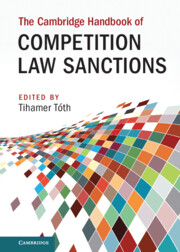Book contents
- The Cambridge Handbook of Competition Law Sanctions
- The Cambridge Handbook of Competition Law Sanctions
- Copyright page
- Contents
- Authors’ Affiliations
- Acknowledgment
- Part I General Chapters
- 1 The Quest to Create an Effective Set of Competition Law Sanctions
- 2 The Role of Fines in the Toolkit of Competition Agencies
- 3 Sanctions on Legal Persons
- 4 The Effectiveness of European Antitrust Fines
- 5 Corporate Governance and Competition Law Sanctions
- 6 Antitrust Criminalization As a Legitimate Deterrent
- 7 Criminalization of Anticompetitive Conducts
- 8 “Consensus”-Based Sanctions and Commitments
- 9 Effectiveness of Commitment Decisions
- 10 Compliance Policies and Sanctions
- 11 The Role of Administrative Courts in the Effective Enforcement of Competition Law Sanctions
- 12 Civil Sanctions in Antitrust Public Enforcement
- 13 What Role for Private Enforcement in EU Competition Law?
- 14 The Insights of Labor Law
- 15 Human Rights Jurisprudence and the Effectiveness of Competition Law Sanction
- 16 Catholic Teaching on Just Punishment, Especially in Connection with Financial Matters: According to the 1983 Code of Canon Law
- Part II Country Reports
8 - “Consensus”-Based Sanctions and Commitments
from Part I - General Chapters
Published online by Cambridge University Press: 29 July 2022
- The Cambridge Handbook of Competition Law Sanctions
- The Cambridge Handbook of Competition Law Sanctions
- Copyright page
- Contents
- Authors’ Affiliations
- Acknowledgment
- Part I General Chapters
- 1 The Quest to Create an Effective Set of Competition Law Sanctions
- 2 The Role of Fines in the Toolkit of Competition Agencies
- 3 Sanctions on Legal Persons
- 4 The Effectiveness of European Antitrust Fines
- 5 Corporate Governance and Competition Law Sanctions
- 6 Antitrust Criminalization As a Legitimate Deterrent
- 7 Criminalization of Anticompetitive Conducts
- 8 “Consensus”-Based Sanctions and Commitments
- 9 Effectiveness of Commitment Decisions
- 10 Compliance Policies and Sanctions
- 11 The Role of Administrative Courts in the Effective Enforcement of Competition Law Sanctions
- 12 Civil Sanctions in Antitrust Public Enforcement
- 13 What Role for Private Enforcement in EU Competition Law?
- 14 The Insights of Labor Law
- 15 Human Rights Jurisprudence and the Effectiveness of Competition Law Sanction
- 16 Catholic Teaching on Just Punishment, Especially in Connection with Financial Matters: According to the 1983 Code of Canon Law
- Part II Country Reports
Summary
In the US, consent judgments, decrees, or orders entered into between merging parties and government are a longstanding tradition. There are three key components to such consensus-based remedies. First, the remedies are not truly a consensus. The second notion is one of transparency: the remedies proposed in such settlements are made public. The nature of the theories of harm the remedies seek to mitigate are public as well. The third notion is typically a question of the overall merits of the remedy. Whether or not a merger remedy is in the public interest is a broad question. This chapter details the common provisions of the Department of Justice and Federal Trade Commission’s settlements, alongside the EU Commission’s settlements. It looks for common weaknesses between the methods of settlement deployed, and the harms to competition that might arise from such systems. It concludes that competition policy is increasingly regulatory and non-adjudicatory. To the extent that consent settlements are important and prominent, it would make sense to have stakeholders have some significant say in the settlement. Lack of meaningful judicial review assures that any concerns are ignored. The authors critically note that lack of transparency assures that any concerns not listed in the proposed settlement are not properly addressed.
- Type
- Chapter
- Information
- The Cambridge Handbook of Competition Law Sanctions , pp. 148 - 163Publisher: Cambridge University PressPrint publication year: 2022

